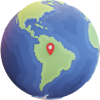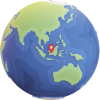Case studies are organised by region, with each region featuring links to the countries where the case studies are located.
Brazil

In Pará, Brazil’s largest palm oil-producing region, violence, land grabbing, and forced evictions of Indigenous, Quilombola, riverine, and campesino communities have been escalating since early 2022. Local leaders allege that government officials have encouraged palm oil producers to suppress any opposition violently. Two major palm oil companies are at the centre of these conflicts. Brasil Biofuels (BBF) is accused of using violence and intimidation against Indigenous and traditional communities. BBF allegedly employs armed security to intimidate and forcibly remove community members from their lands, leading to violent conflicts with the Tembé, Turiuara, and Pitauã Indigenous peoples. Agropalma is linked to fraudulent land grabs, acquiring land with illegal titles, and displacing communities. Despite their denials, both companies are reportedly responsible for severe human rights abuses. Major international brands such Mondelez, Nestlé, PepsiCo, and Unilever continue to source palm oil from BBF and Agropalma, indirectly supporting these human rights violations.
Keywords: Latin America, Brazil, palm oil, primary production, land grabbing, Indigenous rights, human rights violations
Sources: https://www.globalwitness.org/en/campaigns/environmental-activists/amazon-palm/
https://www.globalwitness.org/en/press-releases/brazils-biggest-palm-oil-producers-agropalma-and-brasil-biofuels-human-rights-violations-para-region/
Cameroon

According to Mongabay, an investigation by the Earthworm Foundation into the Belgian company Socfin's oil palm plantations in Cameroon and Sierra Leone has confirmed several human rights abuses, including sexual violence and land conflicts. The investigation revealed that in Cameroon, the Socfin Agricultural Company (SAC) was found lacking in due diligence and safeguards. This has resulted in pollution in rivers, lakes, and lagoons near the company's activities, affecting local water sources that communities depend on. There were also instances where the company failed to implement measures proposed in environmental assessments to mitigate air pollution, impacting the health and environment of nearby communities. The investigators also noted widespread issues of sexual harassment and gender-based violence at the plantation. In addition, there are ongoing disputes over land and lease agreements. Issues with the implementation of concession agreements and compensation schemes were identified, showing that promises made to local communities have not been fully honoured. In response to such human rights violence and pollution, recommendations for strengthening reporting mechanisms were made. Some progress has been observed with a land mapping exercise, yet scepticism persists about Socfin's accountability and effectiveness in implementing changes.
Keywords: Sub-Saharan Africa, Cameroon, palm oil, primary production, human rights violations, land grabbing
Sources: https://news.mongabay.com/2024/06/investigation-confirms-more-abuses-on-nigeria-sierra-leone-socfin-plantations/
Colombia

In Colombia, labour rights violations in the palm oil industry are rampant, characterised by exploitative practices and corporate impunity. The industry is large and promoted by the government, yet most of its 130,000 workers are employed in illegal and harsh conditions. Major companies, such as Paligrow, have been involved in wage theft and have denied their workers collective bargaining rights. Employees also often work in unsafe conditions, with injuries being frequent. Paligrow also uses subcontracting schemes, such as “worker cooperatives” and “simplified stock corporations” in order to avoid employment costs, including contributing to social security benefits. This undermines workers’ rights and complicates enforcement under the U.S.-backed Labor Action Plan, which mandates fines for such subcontracting but remains largely unenforced. Paligrow is only one of the numerous major companies that reportedly employ such exploitative practices. Furthermore, the climate for labour organising is highly dangerous, with over 150 union leaders in the palm oil sector murdered since 1998. Between 2011 and 2015, there were over 1,933 threats and acts of violence against workers, including 121 assassinations.
Keywords: Latin America, Colombia, palm oil, primary production, forced labour, human rights violations
Sources: https://laborrights.org/blog/201605/displacement-death-and-worker-exploitation-corporate-crimes-colombia%e2%80%99s-palm-oil-industry

In Colombia’s Guaviare department, the nomadic Indigenous tribe Nukak Makú is currently endangered by illegal palm oil plantations, coca cultivation, and cattle ranching. The tribe first made contact with the outside world in 1988, and since then, the incursion of external activities has pushed them to the brink of physical and cultural extinction. Indeed, despite their territory being an officially recognised Indigenous reservation, the Nukak have been losing their home to illicit activities. Deforestation and land grabs are driven by criminal groups and former settlers transforming the land for agricultural use. Illegal palm oil plantations have spread in the Guaviare region, encroaching on the reservation. In the past, the region was also heavily affected by armed conflict involving paramilitary groups and guerrillas, further displacing the Nukak people. Despite legal protections and court orders aimed at curbing deforestation and environmental crimes, enforcement has been weak, and illegal activities continue to threaten the Nukak's territory.
Keywords: Latin America, Colombia, palm oil, cattle, primary production, Indigenous rights
Sources: https://news.mongabay.com/2020/12/palm-oil-coca-and-gangs-close-in-on-colombias-indigenous-nukak-maku/
Ecuador

The Ecuadorian community of Barranquilla de San Javier, located near the northern border with Colombia, is fighting to retake its land from a palm oil company that has allegedly used questionable permits and expensive lawsuits to maintain a hold on the area. The Afro-descendant community has lived on this land since at least the 1600s and received official recognition and a land title in 2000. Despite these protections, their ancestral lands have been illegally appropriated by Energy & Palma, a company operating under La Fabril Group, which supplies palm oil to global corporations like Pepsico, General Mills, and Nestlé.
Since Energy & Palma began operations in 2006, the community has reported significant environmental damage. The company's plantations have degraded the quality of land crucial for subsistence farming and have polluted local water sources with agrochemicals, causing health issues among residents. These operations have led to the contamination of rivers and drinking water, contributing to illnesses and diminishing the community's food security.
Keywords: Latin America, Ecuador, palm oil, primary production, procurement of permits, Indigenous rights, land grabbing, human rights violations, corporate negligence
Source: https://news.mongabay.com/2023/06/palm-oil-company-in-ecuador-operates-illegally-on-ancestral-land-community-says/
Gabon

According to Mongabay, Olam, a Singapore-based agribusiness giant and FSC-certified palm oil producer, has allegedly deforested over 25,000 hectares of wildlife-rich rainforest in Gabon to develop palm oil plantations. Mighty Earth first filed a complaint against Olam in 2016 after publishing a report in December that year, alleging that Olam cleared nearly 40,000 hectares of rainforest. Olam denies these claims, arguing the cleared areas were highly logged and degraded secondary forest, not high carbon stock (HCS) forests as claimed by Mighty Earth. Olam’s group head of external affairs, Steve Fairbairn, stated that areas of high conservation value (HCV) were left untouched and are now strictly protected. He mentioned that about 50% of the most severely impacted and low-value regrowth areas were available for plantation development. Additional reports, such as one by the World Rainforest Movement, accused Olam of neglecting local community rights and making insincere deforestation commitments. It is suggested that Mighty Earth was motivated by the commercial timber value in the cleared areas, with timber revenues being invested in community-managed social funds.
Keywords: Sub-Saharan Africa, Gabon, palm oil, primary production, agriculture, deforestation
Sources: https://news.mongabay.com/2020/08/probe-begins-into-alleged-deforestation-by-olam-worlds-largest-farmer/
Guatemala

In Sayaxché, a region located in the Petén Department of Guatemala, the expansion of palm oil cultivation has resulted from aggressive, and often coercive, land acquisition. The growth rate of palm plantations in the region increased from 465 hectares in 2000 to 28,554 hectares in 2010. To acquire such a vast expanse of land, palm companies have used tactics based on deceit and coercion, resulting in aggressive land grabbing. Land grabbing is carried out through intermediaries who pursue persistent persuasion, often offering upfront payments. Some intermediaries will also pressure local farmers to sell their land by making false promises, deceitfully giving the impression of short-term financial gain. Indeed, many landowners are promised new, lucrative employment opportunities, which either fail to materialise or are, in reality, informal and poorly paid. Additionally, palm companies may use community and religious leaders to exert social pressure on landowners to sell their properties. Overall, this aggressive, large-scale land grabbing has transformed the landscape from a diverse pattern of land ownership to large contiguous areas under palm cultivation. Local landowners are often left in dire economic situations, with no job opportunities remaining, forcing them to relocate.
Keywords: Latin America, Guatemala, palm oil, primary production land grabbing
Sources: https://verite.org/wp-content/uploads/2016/11/RiskAnalysisGuatemalanPalmOilSector_0.pdf

A Guatemalan palm oil company, linked to an oil spill into Guatemala's Pasion River and to numerous human rights abuses, has been charged with corruption and fraud. According to Friends of the Earth, Reforestadora de Palma S.A. (RESPA) was involved in an immense fish kill along the Pasión River in 2015 due to pollution from their processing plant, affecting 12,000 people. The company was charged with "ecocide" but the ruling was not enforced after the murder of a key plaintiff, Indigenous leader Rigoberto Lima Choc. Subsequent investigation revealed REPSA’s involvement in several illegal activities such as corporate corruption and environmental mismanagement. Such issues are systemic in Guatemala, where corruption is high, with REPSA being amongst nine companies other charged with influence peddling and bribery. Four high-level executives, including directors Hugo and Juan Milton Molina Botrán, face arrest orders. In addition, REPSA is also allegedly involved in several human rights abuses, rampant in Guatemala’s palm oil sector. Despite the devastating impact of this scandal, the Rainforest Action Network reported in 2021 that Cargill and Nestlé had quietly resumed sourcing palm oil from REPSA. These commercial ties were suspended following the 2018 arrest of REPSA executives, but have since resumed.
Keywords: Latin America, Guatemala, palm oil, primary production, corruption and bribery, human rights violations
Sources: https://www.ran.org/press-releases/cargill-nestle-resumed-palm-oil-sourcing-in-guatemala-despite-legacy-of-violence-and-intimidation-advocates-find/
Honduras

Organised crime groups engaging in drug trafficking and the illicit palm oil trade often exploit environmental reserves in Honduras. There is a rapid spread of oil palm plantations in the country, as palm oil is increasingly a high earning and low production export. Palm oil accounts for about 40% of global demand for vegetable oil as both food and fuel, with annual production having more than quadrupled since 1995. Palm oil, however, presents a serious threat to the biodiversity of the wetlands and the water quality of communities, among other environmental and health threats.
Making matters worse, illegal palm oil crops are increasingly being harvested by drug traffickers and other criminals in Honduras, with illegal plantations occurring across national parks and other environmental reserves. Investment in palm oil can provide criminals with a seemingly legitimate reason to use and control land in certain areas, as well as seemingly legitimate income that can be used to launder criminal proceeds.
Keywords: Latin America, Honduras, palm oil, primary production, serious organised crime, drug trafficking, illegal deforestation, money laundering
Source: https://www.theguardian.com/global-development/2023/nov/27/deadly-harvest-how-global-demand-for-palm-oil-is-fuelling-corruption-in-honduras
Indonesia

Mongabay reports that Indonesian prosecutors have charged three major palm oil companies, Permata Hijau Group, Wilmar Nabati Indonesia, and Musim Mas, with corruption related to a cooking oil shortage in 2022. It was revealed that executives from these companies had bribed a trade ministry official to secure export permits for their crude palm oil. These permits allowed the companies to bypass the government-imposed domestic market obligation (DMO) and domestic price obligation (DPO). The DMO required companies to allocate a certain quota of palm oil for the domestic market to ensure supply during the shortage. The DPO capped the selling price of palm oil domestically to keep it affordable for consumers. Overall, the company’s fraudulent behaviour allowed them to sell palm oil abroad at higher prices rather than adhering to domestic price caps and quotas intended to address the shortage. This corruption caused state losses estimated at 6.47 trillion rupiah ($432 million). The executives and the official have already been convicted and jailed, with sentences recently extended.
Keywords: South East Asia & Pacific, Indonesia, palm oil, primary production, trade and transport, corruption and bribery
Sources: https://news.mongabay.com/2023/06/palm-oil-giants-face-corruption-charges-as-indonesia-probe-widens/


The Environmental Crimes Financial Toolkit is developed by WWF and Themis, with support from the Climate Solutions Partnership (CSP). The CSP is a philanthropic collaboration between HSBC, WRI and WWF, with a global network of local partners, aiming at scaling up innovative nature-based solutions, and supporting the transition of the energy sector to renewables in Asia, by combining our resources, knowledge, and insight.


